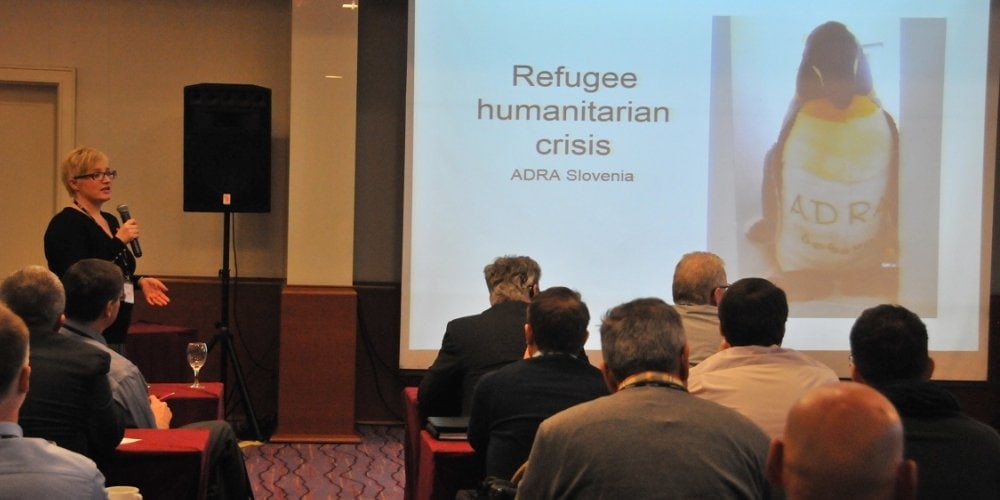
It can’t be easy sitting in a comfortable hotel room knowing that thousands of refugees are passing through a major transit center just two hours down the road.
But comfort was not the issue as directors from the Adventist Development and Relief Agency joined Seventh-day Adventist Church leaders from across Europe to coordinate their response to the continent’s refugee crisis.
Attendees of the two-day European Refugee Summit in Zagreb, Croatia, agreed to create a new position of regional coordinator who ensures that adequate assistance is available to refugees across Europe, including in countries such as Macedonia where ADRA’s offices are staffed solely by volunteers and in Greece, which does not have an ADRA office.
The regional coordinator, who is to be chosen shortly, would work with ADRA’s offices across Europe and the church’s Trans-European Division and Inter-European Division.
The summit also resolved to seek ways to boost funding for refugee efforts; to improve communication within the church, with the public, and with refugees; and to develop training materials for church members to help them better understand how to interact with refugees.
Attendees listened intently as Jasna Barberic, a senior official with the United Nations refugee agency, emotionally shared stories of success and unfulfilled needs, particularly in regards to a lack of interpreters. She wept for the 4,000 people who died trying to reach Europe by sea in 2015.
“It is very concerning as our primary goal is to save lives,” Barberic said.
More than 1 million people entered Europe last year, many fleeing conflicts in Syria, Iraq, and Afghanistan, and another 29,500 people have arrived by sea so far this year.
Barberic’s call to save lives matched a morning worship message given by Chad Stuart, pastor of the 2,400-member Adventist church in Spencerville, Maryland.
“Our vocal response as Christians must always be compassion,” Stuart said, reiterating a sermon about refugees that he had given to his congregation on a recent Sabbath.
Summit attendees then saw that compassion in action as reports were presented about the Adventist response to the migrant crisis. The reports included an ASI mobile clinic bus parked near the beach on the Greek island of Lesbos and ADRA’s work in refugee transit countries such as Macedonia, Bulgaria, Serbia, Croatia, Slovenia, and Hungary. ADRA and church members are also working with refugees in Germany, Norway, Sweden, and Finland, the countries where many refugees wish to settle.
The presenters spoke of numerous challenges, starting with the cold weather. Maja Ahac, who has coordinated work at a transit train station in Slovenia, said the local ADRA mascot was a penguin because the weather conditions were so cold. While praising the work of her team of volunteers, she also noted the difficulties that refugees face because of poor traveling conditions, illness, and sexual abuse en route. She spoke of hate speech and threats that can be directed both at refugees and those trying to help them.
Read ADRA volunteers hear harrowing stories in Slovenia
Ahac joined attendees from other countries along the refugee route to express concern about a looming funding crisis.
“We will run out of money by the end of March,” she said.
Practical help can often be simple but much appreciated. An ADRA representative said refugees were overjoyed with the distribution of 350 baby carriers and 300 cubic meters (10,600 cubic feet) of much-needed winter clothes in Macedonia.
At Slavonski Brod, the largest refugee reception center in Croatia, located just 120 miles (190 kilometers) from the summit in Zagreb, ADRA workers found that one of their most popular initiatives had been to place 18 panels that provide 720 places to charge cell phones in rows outside their shipping container-turned-office.
In Serbia, ADRA runs an information center in Belgrade that offers asylum information, psychological support, and an area for children to play and mothers to breastfeed.
It’s a new role for ADRA’s European offices, which once worked primarily as donor agencies that sent aid to far-off countries but now find their own communities filled with needy migrants. ADRA personnel are seeking to work with local churches to provide support for refugees wishing to settle down. In Germany, ADRA’s work is at the grassroots level and fully supported by church members. This includes providing language classes, activities to refugees during the time they are not allowed to work, and helping refugees understand the values and attitudes of the local culture.
In Sweden, ADRA’s main focus remains on projects in Yemen and Syria, while local churches provide support to newly arrived refugees. Members from one church are visiting refugees at a former Adventist sanitarium that the government has turned into a refugee center. The church members, among other things, are teaching refugees how to ski — an essential skill for the Swedish winter.
Read Adventists reach out to migrants from Austria to Britain
Summit attendees from all European countries that receive refugees described integration as crucial. In Norway, for example, a working group has been set up between ADRA and the Norwegian Union Conference’s health and education departments. The group has sent assessment letters to local churches and will provide training to members at camp meetings in May.
Summit attendees kept returning to the issue of funding. The best way for church members, especially those who live far from the migrant crisis, to participate is by making a donation to their local ADRA office, attendees said.
Volunteers, particularly those in countries grappling with a flood of refugees, are also welcome and should contact their local church or ADRA office for details.
For Ahac, the representative of ADRA’s office in Slovenia, the call is urgent. Slovenia has just 500 Adventist believers in a population of 2 million.
“Get your hands dirty,” Ahac said. “Take action. Get involved in the story. Your life will be changed.”